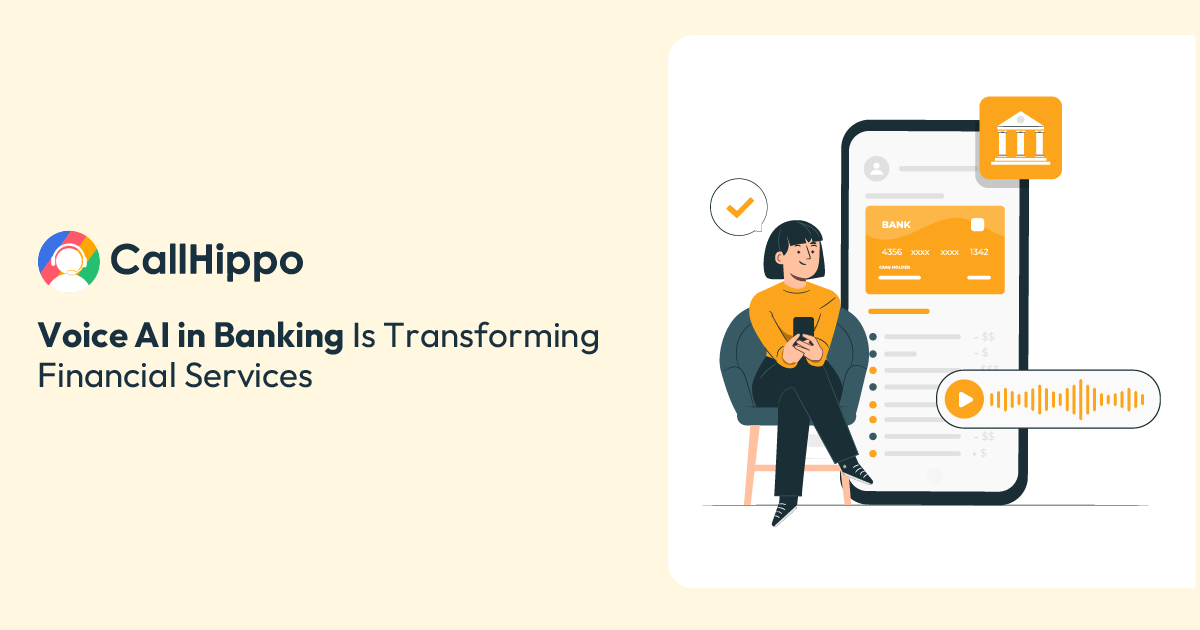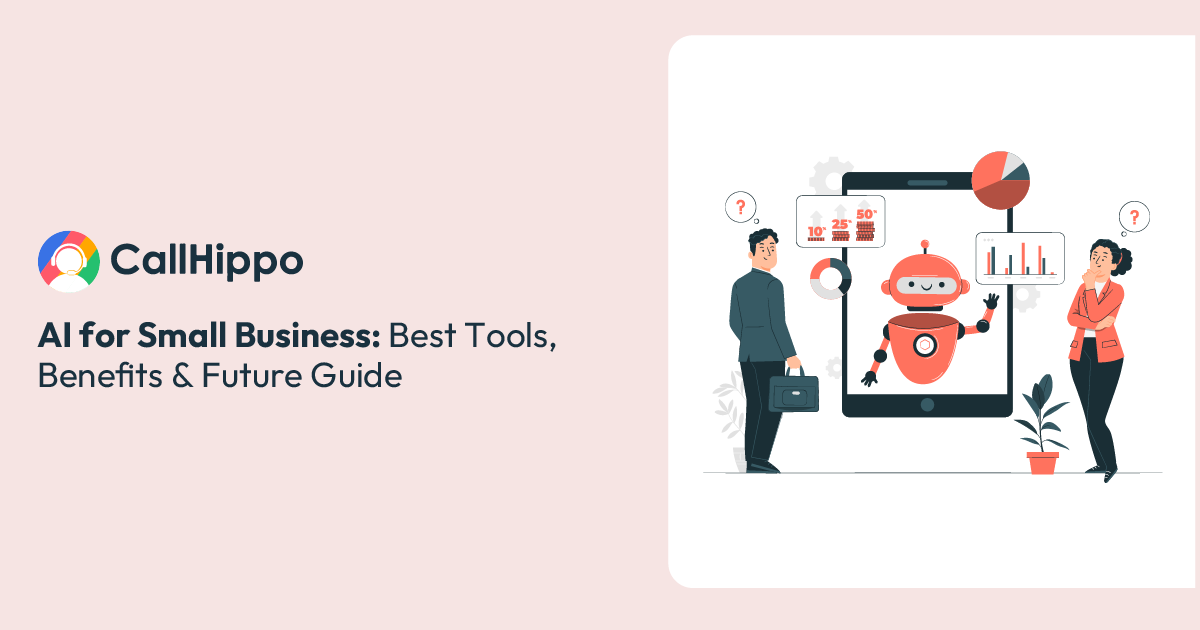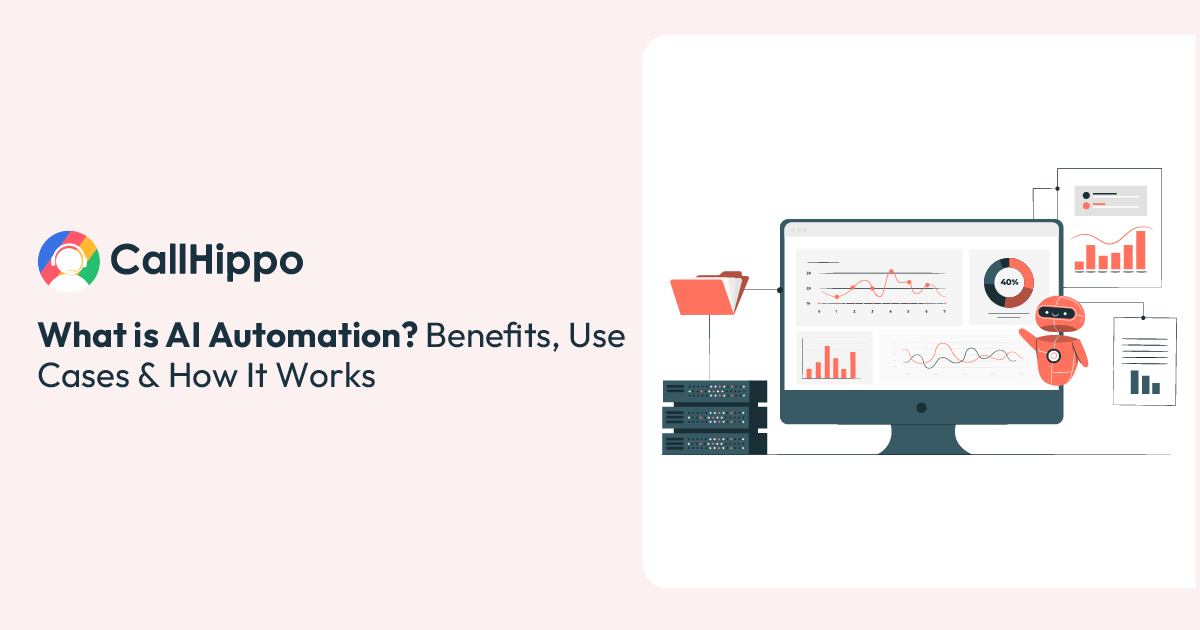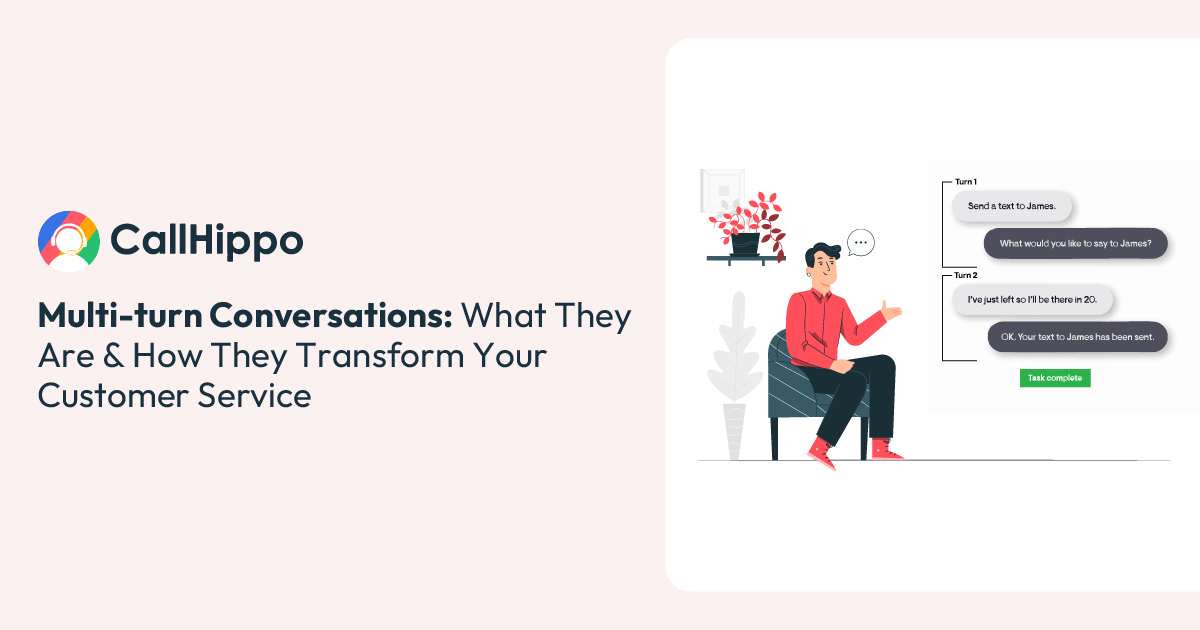AI Voice Agent for Handling Inbound Calls
Automate responses to inbound calls, manage customer inquiries 24/7, and route calls effectively.











AI Voice Agents - Built for Real Business Needs
CallHippo’s AI Voice Agent automates customer interactions, boosts satisfaction, and delivers real-time insights so your team can focus on what truly matters.
Books Meetings Automatically
Effortlessly schedules appointments, saving time and eliminating the need for manual input, so your team can focus on more important tasks.
Human-Like Conversations
Tailors each interaction to the unique needs of your customers, enhancing their experience and building stronger, more meaningful relationships.
Transfers Calls to Human
Transfers calls to the appropriate department or team member quickly and accurately, reducing hold times and ensuring faster resolutions.
Screens Leads Efficiently
Automatically evaluates and qualifies leads, ensuring your sales team spends their time on high-quality prospects who are most likely to convert.
Answers Calls 24/7
Ensures your customers have access to support anytime, day or night, providing constant assistance and improving customer satisfaction.
Provides Real-time Insights
Offers real-time analytics that empower your team to make data-driven decisions, optimize strategies, and improve overall performance.
See AI Voice Agent in Action
Watch our quick demo to explore the features and functionalities of CallHippo’s AI Voice Agent dashboard, designed for automating calls.
Smart Solutions for Every Use Case, One Voice Agent
Whether it’s support inquiries, CRM integration, or lead capture, this AI Voice Agent makes business interactions smooth and efficient.
Build Your AI Voice Agent
Create your AI Voice Agent and train it in selling skills. Select the right tone for smooth customer interactions.



Craft the Perfect Script
Generate personalized support agent scripts based on each query’s needs. Your AI Agent delivers the perfect message every time.
Simulate a Demo Call
Test drive your AI Voice Agent with a live demo call. Fine-tune its interactions as it engages leads with precision and confidence.




Ready to Go?
Deploy your AI Voice Agent once satisfied with its performance. Let it convert leads into customers around the clock.
Why Choose Our AI Voice Agent for Inbound Success?
See how our AI Voice Agent delivers powerful results and enhances your customer interactions that truly makes a difference.
AI That Pays for Itself
Find out in seconds how much time and money you could save with AI Voice and Sales Agents. No spreadsheets, no guesswork—just clear numbers that speak for themselves.
Your Estimated Savings
Let’s face it, who doesn’t love saving money?
What will you do with the extra time?
Understand More About AI Voice Agents?
Curious about how AI Voice Agents work? Discover how they automate customer calls, enhance communication, and streamline support processes, all while improving efficiency.
AI voice agents are tools that use generative AI, natural language processing (NLP), and speech recognition to handle voice-based conversations without a human on the other end. They listen to the caller, interpret what they require, and then offer them the correct response. An AI Voice agent can provide answers, get customers to their desired location, schedule an appointment, or even transfer their call.
AI Voice agents are available 24/7 and ensure that no calls go unanswered. This is most beneficial for companies that receive a high volume of incoming calls and want to respond to every customer. The best part is that it doesn’t just give robotic replies. It can be trained to speak in a polite and professional tone, answer questions clearly, and even handle multiple languages.
How do AI Voice Agents work?
AI voice agents use smart technology to listen, understand, and respond to voice commands in real time, making interactions seamless and efficient. Here's how they work.
1. Speech Recognition
- The first step is converting spoken words into text. This helps the system read what the caller is saying.
- Modern speech recognition tools can handle different accents, speaking speeds, and background noise.
- They also detect keywords and phrases that give clues about what the caller wants.
2. Natural language understanding
- NLP is what helps the system understand the meaning behind the caller’s words.
- It doesn’t just read the text but also looks at the context, tone, and even urgency.
- It also supports longer conversations where the caller asks follow-up questions.
3. Generative AI for Responses
- Once the system understands the question, generative AI is used to come up with the best reply.
- It pulls from company data, customer records, or FAQs to give accurate answers.
- It can also take action, like booking a slot, placing an order, or making a call to a live agent if needed.
4. Text-to-Speech (TTS)
- The final step is converting the reply back into spoken words.
- This is done using text-to-speech tools that sound clear and human-like.
- The voice can be customized to match a brand’s tone or even speak in different languages.
AI Voice Agents can be used across many industries to handle inbound calls, provide instant responses, and manage customer interactions without human support. These voice agents are ideal for any business that receives a high volume of customer calls and wants to improve service without hiring more staff. Here are some of the real world example:
1. Customer Support Centers
AI voice agents are widely used in customer service to answer common questions, handle complaints, and provide account details. They can work 24/7, so your customers never have to wait for business hours to get help.
2. E-commerce and Retail
In online shopping and retail, AI Voice Agents can assist customers with order tracking, return requests, payment issues, or product information. They can even take orders over the phone, reducing cart abandonment and missed sales.
3. Healthcare Providers
Clinics and hospitals use voice agents to schedule appointments, send reminders, and provide basic health instructions. This helps reduce no-shows and saves staff time on routine calls.
4. Real Estate Agencies
Real estate agents can use AI Voice Agents to answer property inquiries, book viewings, and qualify leads. The agent can even pass the call to a human once a lead is confirmed.
5. Insurance Companies
AI Voice Agents help insurance firms by answering policy questions, guiding customers through claims, and collecting necessary information during calls.
6. Travel and Hospitality
Travel companies, hotels, and airlines can use AI agents to confirm bookings, update flight or room details, and handle cancellations.
7. Appointment-Based Services
Salons, clinics, and service centers can let customers book, reschedule, or cancel appointments through the voice agent.
Yes, AI Voice Agents are designed to deliver human-like conversations during phone calls. They use advanced technologies like speech recognition, natural language processing (NLP), and text-to-speech to understand the caller, respond naturally, and adjust based on tone and context.
Unlike old automated phone systems that only follow fixed scripts, AI Voice Agents can carry on a real conversation. They recognize what the caller is asking, even if it’s said in different ways.
What makes the interaction feel natural?
1. Clear Voice Quality: AI Voice Agents speak using realistic, smooth, and clear voices that are easy to understand. They sound professional and can match your brand’s tone.
2. Understanding Emotions and Intent: With the help of NLP, the voice agent can detect urgency or frustration in a caller’s tone and adjust how it responds. For instance, it may offer quicker help if a customer sounds upset.
3. Multi-turn Conversations: The AI can remember what was said earlier in the same call, so callers can ask follow-up questions without repeating everything. This makes the conversation feel more personal and human.
4. Custom Responses: The voice agent can be trained with company-specific data and call scripts, so it gives accurate answers tailored to your business.
Yes, the AI Voice Agent can transfer calls to a human agent or route them to the right department based on the caller’s need. This feature helps businesses manage incoming calls more efficiently by letting the AI handle routine queries and only passing on the important or complex ones to the right person.
The AI Voice Agent listens to the caller’s request, understands the purpose of the call, and decides if it can handle the task. If the call requires human support, the system automatically routes it to a live agent or the relevant team.
Here’s how it improves call management:
- Faster Resolution: Customers get connected to the right person quickly, saving time and reducing frustration.
- Better Call Routing: Calls are directed based on what the customer is asking, not just by pressing numbers in a menu.
- Balanced Workload: The AI handles simple calls, so your human agents can focus on more important issues.
- 24/7 Availability: Even when your team is offline, the AI can manage and route calls as needed.
This routing ability also helps with lead management. If a potential customer is calling and the AI qualifies them as high-value, the call can be sent directly to your sales team to follow up in real time.
Yes, the AI Voice Agent supports multilingual conversation. It allows businesses to interact with customers in their preferred language. This feature helps improve customer experience, especially for companies that serve people from different regions or language backgrounds.
When a customer calls, the AI Voice Agent can detect and respond in the right language. It ensures smooth communication without delays or misunderstandings. This makes it easier for customers to explain their issues and receive accurate help, no matter what language they speak.
How does this help your business?
1. Reach a Wider Audience: You’re not limited to English-speaking customers. You can serve people in multiple languages, which builds trust and makes your brand more accessible.
2. Better Customer Satisfaction: People feel more comfortable when they can speak in their own language. Multilingual support makes customers feel heard and valued, improving their overall experience.
3. Faster Problem Solving: Clear communication means fewer misunderstandings and quicker resolutions. The AI understands the customer’s needs right away and gives relevant answers in their language.
4. Consistent 24/7 Support: The AI Voice Agent is available all the time and can speak different languages day or night.
By supporting multilingual conversations, the AI Voice Agent helps you build stronger customer relationships and gives your business a professional image.
After a call handled by the AI Voice Agent ends, you can view all important call-related information directly from the CallHippo dashboard. This is done by clicking on the Call Logs section, which is a one-stop place to track all inbound and outbound calls made through your account.
Here’s what you’ll find in the call log after a conversation is completed:
1. Number Name
This shows the name or label associated with the phone number that made or received the call. It helps you quickly identify the source or destination of the call.
2. User
This column displays the user or agent (AI or human) who handled the call. It helps you monitor which agent or system responded to each customer.
3. Client
The client's details (such as caller ID or contact name) are listed here. This is useful for follow-ups or customer service tracking.
4. Status Info
This indicates the call status, such as completed, missed, or failed. It gives you an overview of how many calls were successfully handled versus those that need attention.
5. Date & Time
You can see exactly when the call took place. This timestamp helps in tracking call history and analyzing peak hours or response times.
6. Duration
The total length of the call is displayed, helping you understand how long customer conversations usually last.
7. Recording/Note
Each call can be recorded and stored, allowing you to review conversations later. This is especially helpful for quality checks, training, and resolving disputes. Notes added during or after the call may also be available here for additional context.
These details give your business a clear view of customer interactions, helping you track performance, analyze conversations, and improve service. With everything neatly organized in one place, managing and reviewing call history becomes fast and efficient.
Setting up a voice AI agent for your business with CallHippo helps you manage inbound calls, answer customer queries, and automate daily tasks. Follow these simple steps to get started:
Step 1: Open the CallHippo Dashboard and Select AI Voice Agent
Log in to your CallHippo account and head to the main dashboard. Click on the AI voice agent icon in the left-hand corner. Once you click on it, you’ll get an option labeled “Create AI Voice Agent.” This will begin the setup process.
Step 2: Enter the Agent Name
Give your AI Voice Agent a name. This will help you organize and manage multiple agents if needed. For example, one for support and the other for sales.
Step 3: Click On Train the Agent (Using URL or Manual Input)
Next, you’ll need to train the agent. You can do this in two ways:
- Using a URL: Enter a link to your website’s FAQ or help section.
- Manual Input: Add key information manually, such as common questions, answers, and important phrases.
This step helps the agent understand how to handle customer inquiries and give accurate, helpful responses.
Step 4: Access the Agent List and Monitor Setup Progress
Once created, your AI Voice Agent will appear in the dashboard under a list that shows:
- Agent name
- Assigned number(s)
- Setup progress (e.g., In Progress or Completed)
- Status details
- View call logs
- Action buttons like Settings and Delete
This list allows you to manage each AI agent easily, track performance, and make adjustments as needed.
Step 5: Assign a Phone Number
After setup, assign a business phone number to your agent. This is the number customers will use to reach your AI Voice Agent.
Step 6: Review and Deploy
Once everything looks good and the setup is complete, your AI Voice Agent is ready to go live. It can now answer calls, respond to customers, transfer calls when needed, and work 24/7.
CallHippo’s AI Voice Agent is a powerful solution for managing inbound calls efficiently. It helps businesses stay available 24/7, handle customer queries instantly, and reduce wait times, all while improving service quality. Here are some of the top benefits:
1. Round-The-Clock Availability
The AI Voice Agent answers calls any time of day, ensuring your customers never hear a busy tone or experience long hold times. This improves satisfaction and keeps your business responsive even outside working hours.
2. Smart Call Routing
It also offers smart call routing, automatically directing callers to the right department or team based on their needs. This saves time and avoids unnecessary transfers. In addition, it supports multilingual conversations, allowing your business to serve a diverse customer base more effectively.
3. Lead Qualification & Multilingual Conversations
AI agent can qualify leads, identify high-priority inquiries, and escalate them when needed. The voice agent can speak in multiple languages, making it easier to support customers from different regions without language barriers.
4. Scalability
The AI can manage thousands of calls at once, making it ideal for growing businesses that can’t afford to miss a single customer call. It also reduces costs by automating repetitive tasks like answering FAQs or AI scheduling appointments.
5. Personalized Interactions
CallHippo’s AI Voice Agent can be personalized with the right tone and custom scripts, so it matches your brand voice. With seamless CRM integration and real-time updates, it keeps your team in sync and ensures a smooth customer experience.
To get the most out of CallHippo’s AI Voice Agent, it’s important to follow a few simple best practices. These steps will help you improve performance, offer better customer service, and make your inbound call handling more effective.
1. Set clear goals
Start by deciding what you want your AI Voice Agent to do. Whether answering basic queries, routing calls, booking appointments, or handling order requests, having clear objectives helps you design better scripts and workflows.
2. Use well-crafted scripts
Your AI Voice Agent speaks on your behalf, so it should sound clear, polite, and helpful. Write scripts that match your business tone and cover common customer questions. Avoid long or confusing sentences. Instead, keep the language simple and focused on solving problems.
3. Test and fine-tune regularly
Don’t just set up the AI and forget it. Use CallHippo’s demo call feature to test how it handles conversations. Try different scenarios and see how it responds. Make changes where needed so the agent stays accurate and easy to talk to.
4. Keep information updated
If your business hours, pricing, or policies change, make sure your AI Voice Agent is updated too. Outdated answers can frustrate customers and lead to missed opportunities.
5. Monitor call performance
Track how your AI Voice Agent is performing. Look at things like call duration, resolution rates, and how often it transfers calls to human agents. This data helps you spot problems early and improve customer service over time.
6. Enable smooth transfers
Sometimes customers need to speak to a person. Make sure the AI can easily transfer calls to human agents or the correct department when needed. This shows customers you value their time.
7. Use multilingual options
If your customers speak different languages, enable the multilingual feature. This makes interactions more comfortable for them and builds trust.

Our AI Voice Agent powers interactions for brands that thrive on efficiency and growth. Automate, optimize, and deliver results, all in one platform.
Talk to an ExpertAI Voice Bots That Work Smarter, So You Scale Faster
Automate conversations, manage tasks in real-time, and engage customers around the clock without missing a single interaction.
Always-On Availability
Your AI Agent never sleeps, ensuring every query gets an instant response, day or night.
Automated Bulk Outreach
Make thousands of calls simultaneously without lifting a finger.
Multi-Language Conversations
Speak your customers' language, anywhere, anytime.
AI-Driven Lead Qualification
Identify high-value leads in real-time and escalate them automatically.
Frequently Asked Question
-
An AI voice agent is a software system that uses artificial intelligence to interact with people using speech. It can answer questions, handle tasks, and even hold conversations, often used in customer service for handeling inbound calls, and support.
-
The cost of a voice AI agent can range from a few cents per minute to several hundred dollars per month, depending on the service’s features, usage volume, and the provider.
-
Yes, you can! By using voice cloning technology, you can create a digital version of your voice. This involves recording a series of voice samples, which the AI model uses to replicate your tone, speech patterns, and cadence.
-
Yes, most voice AI services charge a fee. Pricing varies depending on whether the service is subscription-based or pay-per-use, and it typically depends on the features offered and how much the service is used.
-
Yes, it is legal to use AI voice, but there are legal considerations. For instance, using AI to impersonate someone without their consent can result in legal issues. Always ensure you have permission to use a voice and follow platform guidelines.
-
Creating an AI voice can take anywhere from a few hours to several days, depending on the complexity of the voice model. Simple clones can be generated quickly, while more advanced versions may require extensive training with larger datasets.
-
AI Voice Agents streamline the policy renewal process by sending timely reminders, answering customer queries instantly, and guiding them through renewal steps. They can also identify upsell opportunities by analyzing customer needs, suggesting add-ons or higher-value plans, and personalizing offers during conversations. This helps businesses increase revenue while ensuring customers never miss a renewal.








